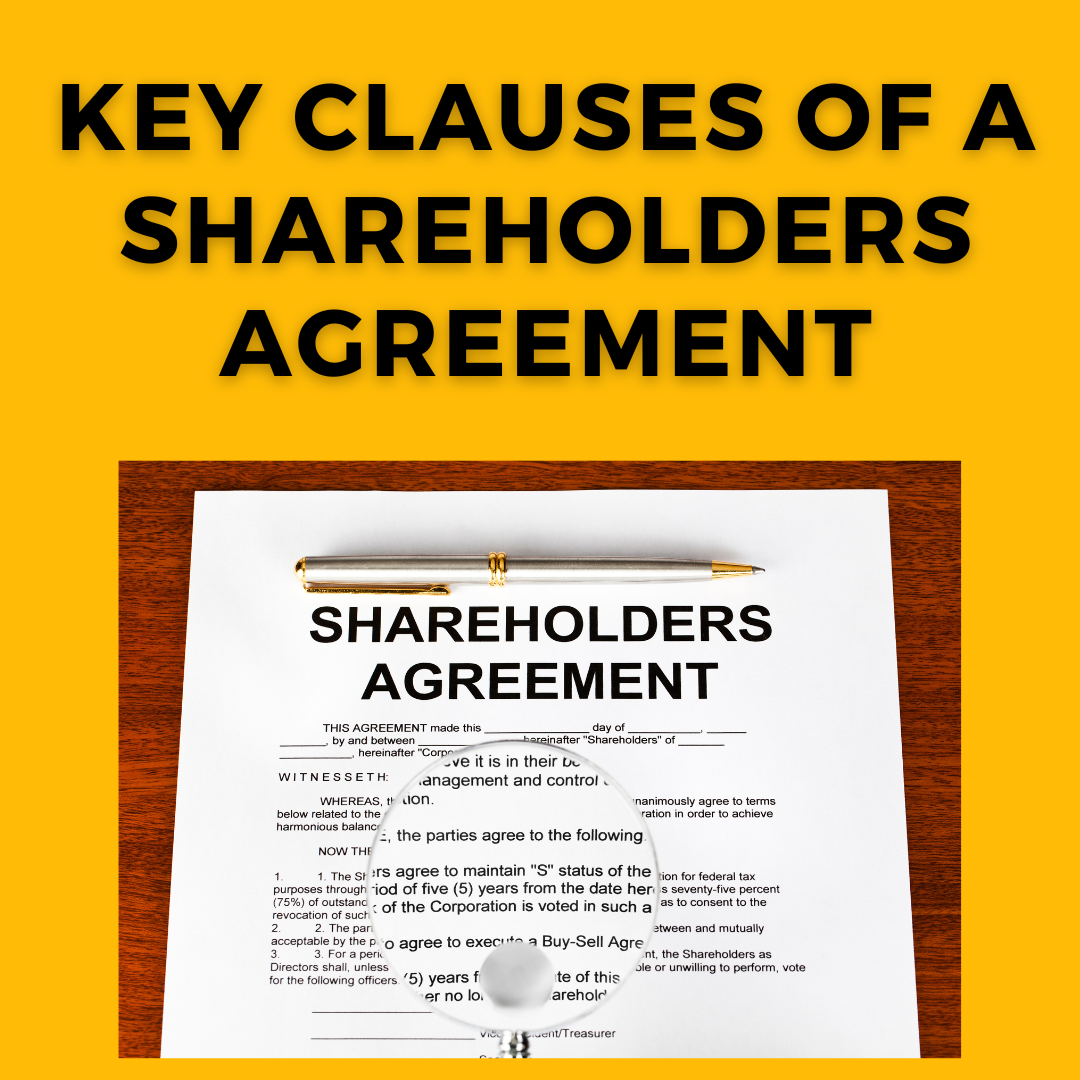This blog post is written by Ms. Ritu Sajnani, Senior Legal Counsel, Coinswitch, Ex-AZB & Partners and Cyril Amarchand Mangaldas.
A Shareholders’ Agreement (“SHA”) seeks to regulate the relationship between the shareholders and the issuer company (the “Company”) itself. SHA particularly governs the rights, obligations, ownership of shares, privileges, voting and various protective provisions of the said shareholders.
Key Clauses
- Board of Directors: This clause deals with the responsibilities, rights, duties, and obligations of the Board of Directors (“Board”). It also includes the composition of the Board which prescribes the manner of appointment, the rights vested with the promoters to alter the Board size, and the voting rights of shareholders pursuant to the process of removal and replacement of directors.
- Board proceedings: This clause stipulates the frequency of the Board meetings, the time interval permitted between both two meetings, the sitting fees of the directors, and the mode of carrying out the Board proceedings. The details regarding the appointment of chairman, constitution of a valid quorum for a Board meeting, the matters in which the quorum requirement is exempted or relaxed, etc. are also listed in this clause.
JOIN NEXT BATCH OF OUR MERGERS & ACQUISITIONS COURSE BY TOP LAW FIRM PARTNERS NOW!
- Committees: This clause envisages those circumstances wherein the Board might have delegated powers to committees of specific directors and/ or officials for specific tasks. It also states aforementioned provisions like quorum and decision making to such delegated committees.
- General Meetings: This clause provisions for the calling of a general meeting along with the mandate of holding a certain number of meetings each year, the quorum required for conducting these meetings and consequently, passing resolutions, sending notice particulars, and provision for holding an extraordinary general meeting.
- Reserved Matters: This clause refers to a set of matters that mandate an additional layer of obtaining consent from a specific group of persons, in order to have a legally binding effect. A violation of this clause, or the failure to obtain the requisite consents, would render any decision made, action taken or resolution passed as void and invalid.
- Exit: This clause confers an obligation upon the Company and its founders to provide a full exit with a stipulated exit period to its investors. Typically, exit can be in any of the following ways:
a) Initial Public Offering (“IPO”): In the event an exit is in the form of an IPO, this clause directs that it shall only be undertaken with the prior written consent of the investors’ majority, in consultation with independent merchant bankers and the statutory guidelines in force.
b) Company Sale: This clause envisages a situation wherein the Company fails to undertake a qualified IPO – in the event of which, it must typically undertake a company sale on the terms and conditions (including pricing) approved by the investors’ majority.
c) Third Party Sale: In the event, the Company fails to provide an exit in the stipulated exit period by way of an IPO or Company Sale, then the investors’ majority shall, by issuing a notice to the Company (Exit Notice), at any time subsequent to the expiry of the exit period, have the right to require the Company to appoint a merchant banker acceptable to them, to find a buyer for the shares held by the investors at a price that is the higher of: (i) Preference Amount; or (ii) Fair Market Value as on the date of the Third Party sale.
d) Buy Back: In the event, the Company fails to provide an exit in the stipulated exit period by way of an IPO or Company Sale or through Third Party Sale, then upon request of the investors’ majority, the Company, at its discretion, may propose by way of a notice (Buy Back Notice), to buy the shares held by its investors (on a pro-rata basis) at a price that is the higher of: (i) Preference Amount on an as-if-converted basis; or (ii) Fair Market Value as on the date of the Buy Back Notice, subject to applicable law in lines with the approval of the investors’ majority.
e) Drag Along Right: In the event, the Company fails to provide an exit in the stipulated exit period by way of an IPO or Company Sale or Third-Party Sale or through buy back or in case of default, the investors’ majority shall have the right and not an obligation to cause the transfer of all shares held by other investors or employees to a bona fide third party (not being an affiliate of any of the dragging investors) at the same price and same terms and conditions as may be offered to the dragging investors by the drag purchasers.
- Event of Default: It is a non-obstante clause wherein in the event of breach, the other parties shall be entitled to seek specific performance and such other rights and remedies as are available to them under applicable law.
- Transfers: This clause fundamentally lays down the legal contours of transfer of shares by shareholders and investors by placing certain restrictions and conferring certain privileges. A transfer undertaken in violation of the agreement would be null, void and not binding on the parties and Company or any of the parties. Typically, the clause on transfers includes the following:
8.1 Right of First Offer (“ROFO”): A ROFO is a contractual obligation pursuant to which any investor intending to sell its share to a third person can only exercise such right after providing the right to purchase said shares to the promoter entity. The clause comprehensively regulates the procedure and manner in which the promoter entity may exercise their right. On the other hand, a Right of First Refusal provides non-selling shareholders with the right to accept or refuse an offer by a selling shareholder after the selling shareholder has solicited an offer for their shares from a third-party buyer.
8.2 Pre-emptive Right: This clause confers a contractual obligation upon the Company by virtue of which, in the event the said Company is desirous of issuing new equity shares, this clause mandates that the Company must provide the existing investors a right to participate in the proposed issuance by subscribing a quantum necessary to maintain their pro-rata shareholding in the Company on a fully diluted basis.
8.3 Tag Along Rights of Investors: In the event, a promoter entity or its affiliates desire to transfer all or part of the equity securities held by them to another person, this clause confers a contractual right and not a mandatory obligation upon the investors to transfer its equity shares at the same price, terms and conditions, on a pro-rata basis, to the proposed transferee.
8.4 Fall Away: This clause is a non-obstante clause which typically states that if the investors and/or its affiliates collectively cease to hold a prescribed number of equity securities or their shareholding falls below a certain threshold, typically all rights conferred upon them in the SHA will immediately and automatically cease to have effect.
- Value Protection/ Anti-Dilution Rights: In the event, the Company intends to issue securities to any third party other than its existing shareholders, which has the effect of lowering the investor’s entry valuation or dilute their effective shareholding in the Company, this clause imposes an obligation upon the Company to take all steps necessary to ensure that the investor is adequately compensated and/or steps are undertaken by the Company in a form and manner satisfactory to the investor.
- Most Favorable Clause: This clause confers an obligation upon the promoter entity that the Company shall not, without prior consultations with the investors, induct any new investor in the Company on terms which are more favorable than the existing shareholders’ rights granted to them under the transaction documents.
- Information and Inspection Rights: This clause imposed an obligation upon the Company to furnish necessary documents like audited and unaudited consolidated financial statements, monthly reports, any updates on functioning and operations on the Company’s business, including any breach of representations and warranted to the investors for their perusal.
- Liquidation Preference: This clause provides how the total proceeds from a liquidity event, shall be distributed between holders of relevant securities.



